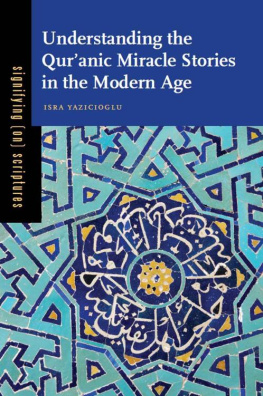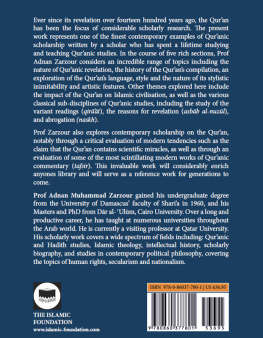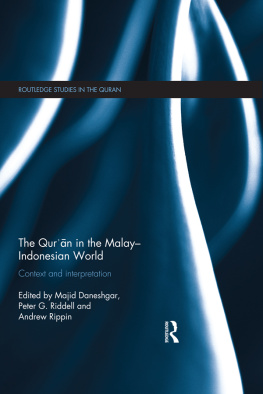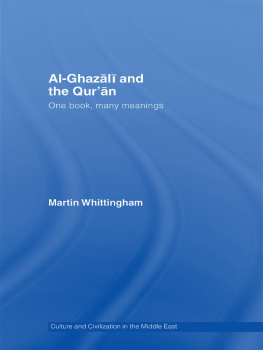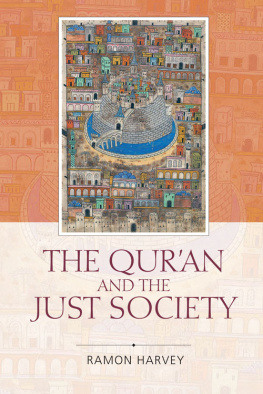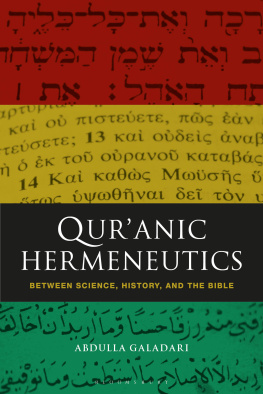Understanding the
Quranic Miracle Stories
in the Modern Age
ISRA YAZICIOGLU
THE PENNSYLVANIA STATE UNIVERSITY PRESS
UNIVERSITY PARK, PENNSYLVANIA
LIBRARY OF CONGRESS CATALOGING-IN-PUBLICATION DATA
Yazicioglu, Isra, 1978
Understanding the Quranic miracle stories in the modern age / Isra Yazicioglu.
p. cm (Signifying (on) scriptures)
Includes bibliographical references and index.
Summary: Explores the implications of Quranic miracle stories for the modern era. Examines the medieval Muslim debate over miracles, and connects its insights with early and late modern turning points in modern Western thought as well as contemporary Quranic interpretationProvided by publisher.
ISBN 978-0-271-06156-6 (cloth : alk. paper)
1. Miracles (Islam).
2. Miracles.
3. QuranHermeneutics.
4. IslamDoctrinesHistory.
I. Title.
BP166.65.Y39 2013
297.1'226dc23
2013023135
Copyright 2013 The Pennsylvania State University
All rights reserved
Printed in the United States of America
Published by The Pennsylvania State University Press,
University Park, PA 16802-1003
The Pennsylvania State University Press is a member of the
Association of American University Presses.
It is the policy of The Pennsylvania State University Press to use acid-free paper. Publications on uncoated stock satisfy the minimum requirements of American National Standard for Information SciencesPermanence of Paper for Printed Library Material, ANSI Z39.481992.
This book is printed on paper that contains 30% post-consumer waste.
WITH GRATITUDE,
to my parents, Selma and Osman,
and to my teachers, Yamina and Ali
CONTENTS
I would like to thank Saint Josephs University for a 2011 summer research grant, which enabled me to make major progress on this book. It is a pleasure to be part of this university, and I am grateful for the collegial department in which I work and all the support I have received over the years.
I am grateful to the Penn State Press editors. The series editor, Vincent Wimbush, like press director Patrick Alexander, has supported this project from early on and has also provided precious feedback. I also offer deep thanks to Tazim Kassam and the anonymous reviewer of this book, who have offered immensely helpful suggestions and constructive criticism. Kathryn Yahner and her team have been so professional and helpful in wading through the publication process. I am especially thankful to Charlee Redman, who answered my endless queries. And I am extremely grateful to Julie Schoelles for incredible, patient, and fine-tuned editing. Thanks also to all of our student assistants at Saint Josephs, including Dana Saraco and Christopher DeMille. Thanks to Hakan Glerce at the Istanbul Foundation for Science and Culture for his kind assistance in locating several conference proceedings about Nursis works. I also appreciate Martin Nyugen and Ayse Polat for generously answering my questions on fine points on such short notice.
I am deeply indebted to various mentors and teachers I have had the privilege to learn from throughout my academic and personal journey. Peter Ochs introduced me to Charles Peirces works and enriched my thinking about issues of interpretation and religious thought in the modern era. He read the earlier versions of my chapters and provided extremely helpful feedback. Peter also introduced me to Scriptural Reasoning. Ive learned a lot from many great colleagues in this interfaith study group, who nurtured the new horizons of scriptural reading that Nursis work had opened up for me. The late Daniel Hardy was one of these wonderful scholars, and his memory and encouragement I shall always cherish.
Jamie Ferreira taught me how to refine my philosophical arguments, and she provided very helpful comments, especially on Humes thought. In addition, Mehdi Aminrazavi and Timothy Gianotti read and provided expert advice on earlier versions of some chapters. I am also very grateful to Sait zervarli for both his helpful scholarly advice and his encouragement. I am also indebted to Abdulaziz Sachedina for his generous support. I would also like to mention one of my dear teachers, Ibrahim Abu-Rabi, who passed away not long ago. May he be rewarded abundantly for his warm encouragement and guidance of all his students, including myself.
Two people introduced me to Islamic studies and have shared lasting insights on Islamic theology, Quranic interpretation, and philosophy of religion: Ali Mermer and Yamina Bouguenaya Mermer. It was also they who introduced me to Said Nursis works and offered tremendous help in understanding his thought. I am grateful for the countless hours they have spent with me discussing fascinating texts and topics as well as for their unwavering encouragement and personal support. Yamina also graciously worked with me through the challenges of writing this book. I am glad to be able to dedicate the book to them. Needless to say, I alone bear the responsibility for its shortcomings.
This book is also dedicated to my dear parents, Selma and Osman Yazicioglu, who have done so much for me throughout my life. I am so grateful for their unfailing compassion, patience, support, and generosity. Being their daughter has been such a blessing for me.
I have been blessed with other wonderful family members and friends, who encouraged me in this book project in various ways. Thank you very much to ammi and abbu -Ghazalah and Masood Sheikh- and to Latife and Rdvan Yazicioglu, Nese Ulker-Cepni, and other family members. I am also grateful to our Beam-Up team, including Aliaa Khidr, Andrea Dzibuek, and Zuleyha Colak. Many thanks to dear Sarra Tlili for her very kind advice and encouragement.
Last but not least, I am deeply grateful to my dear husband Faraz Sheikh, my life companion, who has made the task of writing this book so much easier and more pleasant with his cheerful support and presence. I am also thankful to him for being such a caring father to our son, Isa, when I stayed extra hours in my office.
Many other people have contributed to this project in different ways. May the merciful God, who keeps the record of all good deeds, bless and reward them and all.

